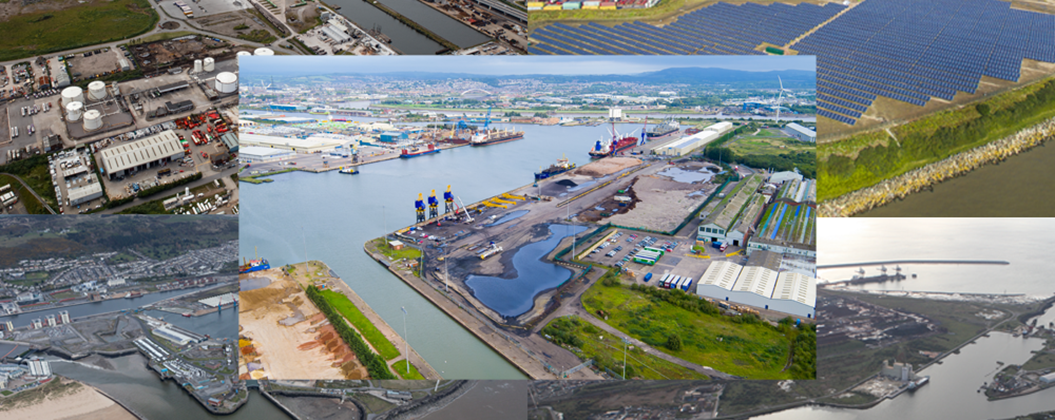Aerial views of ABP’s 5 South Wales Ports; (clockwise from top left: Cardiff, Barry, Port Talbot, Swansea, Newport).
Politicians, industry experts, business groups and academics will gather next month (13th October 2021) to debate the strategic role that ports could play in the future, as Wales looks to tackle a range of key economic and environmental challenges over the next 30 years.
Future ports: Wales vision is being organised by Associated British Ports (ABP) – owners and operators of five of Wales’ largest and most influential ports and includes contributions from the Welsh and UK Governments. Keynote addresses from Julie James MS, Minister for Climate Change and the Secretary of State for Wales, Rt Hon Simon Hart MP will be followed by a wide-ranging panel debate, chaired by Tim Morris, Chief Executive of the UK Major Ports Group.
The event marks the start of ABP’s public and stakeholder engagement, following an extensive master-planning process, involving each of its South Wales ports. The project looked at how the ports may need to evolve and adapt over the next few decades to respond to the challenges presented by climate change, as well as embracing new opportunities, like clean energy, digitally-driven logistics and advanced, port-centric manufacturing.
“Throughout history, ports have always had to adapt to changing economic conditions and volatile markets. The challenges facing many of our industries today will require business leaders and policy makers to work together like never before, in particular to collaborate in order to positively benefit from the opportunities in the emerging post-carbon economy,” said Andrew Harston, Director of Wales and Short Sea Ports for ABP.
“We have looked closely at the DNA of our five ports in South Wales and challenged ourselves to think about what they could look like in the future. Not just in five to 10 years, but in 30 or 40 years’ time. What type of infrastructure will future ports need? How is the use of land, mix of tenants and types of activity being carried out on ports likely to change? What steps need to be taken now to future proof our ports and ensure they continue to be drivers of economic growth, while doing their bit to protect the environment?”
Future ports: Wales vision is also the title of a White Paper, produced by ABP and set to be launched at the virtual event. The White Paper sets out a series of ‘missions’ that ABP believes are key to a successful industrial future – with goals and objectives that will require a new era of collaboration between port owners and government, industry, academic institutions and local communities.
The four missions, in which ports could play a key role, are;
- Mission 1: Decarbonising energy generation
- Mission 2: Decarbonising the manufacturing process
- Mission 3: Decarbonising the logistics industry
- Mission 4: Creating growth environments for communities, businesses and ecosystems
As political leaders continue to grapple with the implications of the latest report from the Intergovernmental Panel on Climate Change (IPCC) – described by the UN as “a code red for humanity” – cutting carbon emissions from every aspect of society continues to be a shared objective for governments around the world. As the spotlight shines on the UK as it prepares to host the 26th UN Climate Change Conference (COP26) , the stakes have never been higher and the success of these missions becomes ever more critical.
The Minister for Climate Change, Julie James, said:
“Wales’ ports have huge potential to act as important catalysts for a greener and fairer economy – fostering home-grown industries, enabling the deployment of innovative marine energy, facilitating our shift away from fossil fuels, and supporting the protection of marine and coastal habitats.
“We are therefore pleased to support this initiative from ABP to help focus our collective efforts to seize these opportunities for the benefit of Welsh communities and the natural environment on which we all rely.”
Secretary of State for Wales, Rt Hon Simon Hart MP, added:
“Wales’ ports have long been a vital part of the UK’s economy and transport infrastructure and will remain so well into the future. As we transition to the low-carbon green economy of the future I am confident that our Welsh ports will adapt and prosper in a way which protects jobs, creates new opportunities and helps secure economic growth.”
Future ports: Wales vision will be held virtually on Wednesday 13th October, between 10am-12pm and is free to attend. Delegates will have the opportunity to stream the live content, submit questions to the expert panel, network virtually with other attendees and download useful resources. More importantly, they will take part in an important debate on the future transformation of Wales’ ports.
Expert panellists include;
- Chris Williams, Head of Industrial Decarbonisation, Industry Wales
- Paul Slevin, Director of business advisory consultancy Quantuma and President, Chambers Wales
- Rhys Wyn Jones, Director, RenewableUK Cymru
- Simon Brown, Divisional Ports Manager, Associated British Ports
- Tim Peppin, Director of Regeneration and Sustainable Development, Welsh Local Government Association
For more information or to register for Future ports: Wales vision, visit https://freshwater.eventscase.com/EN/ABPWales


